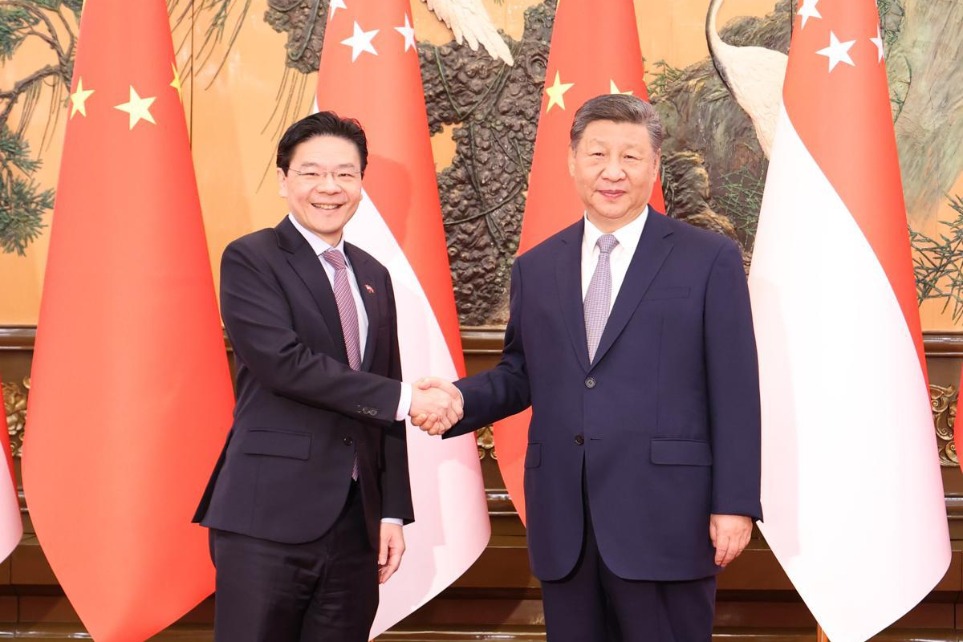Central Asia, China eyeing a better future


The second China-Central Asia Summit, which concluded in Astana on June 17-during the pomegranate blossom season — was especially important because the Kazakhstan capital is where President Xi Jinping proposed the Silk Road Economic Belt, which together with the 21st Century Maritime Silk Road makes up the Belt and Road Initiative, in 2013.
In January 2022, during the video summit on the 30th anniversary of the establishment of diplomatic relations between China and the five Central Asian countries, the six countries agreed to upgrade the China-Central Asian cooperation mechanism to the level of heads of state. Accordingly, in May 2023, the first China-Central Asia Summit was held in Xi'an, Shaanxi province, the starting point of the ancient Silk Road. To demonstrate their commitment to and expectations from the mechanism, the heads of state jointly planted six pomegranate trees in the "China-Central Asia Friendship Forest". Two years later, the six pomegranate trees have not only grown but also are spreading their fragrance.
China and the Central Asian countries have always had close and friendly relations. And since the first summit in 2023, they have been guided by the China-Central Asia spirit, which has helped boost cooperation guided by the six countries' leaderships and yielded common benefits. In fact, multilevel cooperation between China and the Central Asian countries has entered a new phase, with the historical allegories of "envoys keeping each other in sight on the roads" and constant streams of merchants traversing the Silk Road routes once again becoming reality.
Fast-moving modern vehicles, including trains, traveling between China and the Central Asian countries, echo the sound of the caravans on the ancient Silk Road in the new era. The number of sister cities between China and the Central Asian countries now exceeds 100 pairs. Working together to build a closer community with a shared future for China and Central Asia is the common wish of all sides, and this is gradually becoming reality.
However, the world today is not peaceful. The bugles of war have been blowing across some regions. China and its five Central Asian neighbors have maintained peace and stability, because they believe that only in a peaceful, stable, good-neighborly and friendly environment can countries focus on economic development and modernization, and improve people's well-being. And only when countries in a region adopt a win-win attitude and strengthen cooperation can they focus on developing common large-scale projects such as the newly started construction of the China-Kyrgyzstan-Uzbekistan Railway.
Based on their win-win attitude over the past 30 years, China and the five Central Asian countries agreed to work together to unlock the full potential of cooperation in the trade, production capacity, energy and transportation sectors, and create new growth points in fields such as financing, agriculture, poverty reduction, green and low-carbon development, healthcare and digital innovation.
In today's complicated world, various forces and events have been emerging at a rapid pace. Therefore, China and the Central Asian countries must continue to enhance mutual understanding and firmly support each other on their respective core interests. And while welcoming investors to participate in the development of the region, they should resolutely resist any interference by outside forces, and combat the "three evils" of terrorism, separatism and extremism.
Friendships between countries are formed through trade and commercial communication, but they flourish when their peoples engage in heart-to-heart communication in the pursuit of building a shared future. If the countries of the region recognize that they share a common future, no force can stop them from maintaining peace, promoting common prosperity and sharing a happy life.
Although anti-globalization sentiments have been rising in some parts of the world, the historical trend of economic globalization is irreversible, and conflicts avoidable. That's why China and the Central Asian countries have agreed to continue making new achievements, respecting the sovereignty of all countries, pursuing common development and maintaining regional peace and stability.
China and the five Central Asian countries have all established comprehensive strategic partnerships, signed cooperation documents on the joint promotion of the Silk Road Economic Belt, and committed to jointly building a community with a shared future for mankind at the bilateral and multilateral levels.
As for the second China-Central Asia Summit, its most significant achievement was the signing of the treaty of permanent good-neighborliness and friendly cooperation by the six heads of state, marking a new beginning in China-Central Asia relations.
The author is a researcher on Russian studies at the Chinese Academy of Social Sciences.
The views don't necessarily reflect those of China Daily.
If you have a specific expertise, or would like to share your thought about our stories, then send us your writings at opinion@chinadaily.com.cn, and comment@chinadaily.com.cn.

































